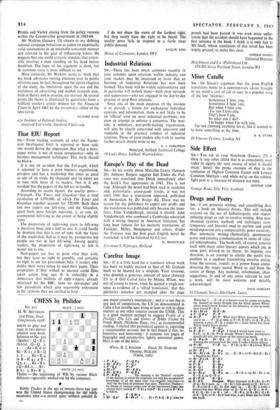That EIU Report
SIR,—From reading accounts of what the Econo- mist Intelligence Unit is reported to have said, one would derive the impression that what a news- paper writes is not of much consequence—only its business management techniques. This myth should be blown.
It is not an accident that the Telegraph, which is reported to have a poor business organisation, prospers and has a readership five times as great as any of its rivals. Its character and its views are in tune with those of its readers. Nor is it any accident that the papers of the left are in trouble.
According to recent figures, the quality press— Telegraph, The Times and Guardian—bas a total circulation of 1,878,000, of which The Times and Guardian together account for 528,000. Both these last two papers are left-wing, and the Guardian, apart from poor foreign reporting, is, as you, sir, commented, left-wing to the extent of being slightly 'zany.'
The proportion of right-wing press to left-wing is therefore three and a half to one. It could hardly be doubted that this is out of tune with the views of the readership. Sad as it may be, prosperous top people are not in fact left-wing. Among quality readers, the proportion of right-wing to left is nearer ten to one.
Newspapers are free to print what they wish, but they have no right to grumble, and certainly no right to ask for government help, if readers who dislike their views refuse to read their paper. Their proprietors if they wished to succeed could fire taken action long ago. It is unhealthy in a democracy that millions of right-wingers, already infuriated by the BBC, have no newspaper and few periodicals which give reasonable expression to the opinions they are entitled to hold. I do not share the views of the furthest right, but they surely have the right to be heard. The quality press fails to respond to a fairly clear public demand. EVELYN KING House of Commons, London SW 1






























 Previous page
Previous page